|

Japanese soldiers playing with Chinese children (1937).
The Japanese troops had a good
relationship with Chinese civilians.
Continued from the former page
(The
Pacific War: part 1 ? The USA Mistook the True Enemy)
War Began between China and Japan
@
After the
battle occurred between the Chinese and the Japanese in Shanghai in 1937,
there was in Japan a violent argument between those who thought Japan should
have entered China to punish the Chinese, and those who thought Japan
should not have done so. The argument lasted a long time but at last, the
former argument prevailed. In this way, Japan
ran out of patience and was compelled to enter China
to fight against the Chinese troops. The war thus began. But Japan fell right
into the communist trap, so the communists laughed and said:
@"While
Japan is fighting against the Nationalists of Chiang Kai-shek, we communists
will be able to rebuild our troops. Japan
will weaken the Nationalists. And then, the USA,
which is angry about the Japanese existence in China,
will destroy Japan.
That will be the opportunity for us to communize China."
@
In fact, it is
famous that after the Pacific War, when China
had become a communist country, Mao-Zedong once told a group of visiting
Japanese politicians, "We could communize China
because Japan
had invaded it. We owe the victory to you," and he ironically
appreciated Japan.
I could say that it was a mistake for the Japanese troops to enter China
crossing the Great Wall and fighting a war against the Chinese troops. Japan
should not have entered the country despite enduring one provocation after
another, if possible. And if the Japanese military forces had not entered China,
there would have been no way to make the USA
angry. But even if it made the USA
angry, it might be said that there was a legitimate obligation for Japan
to stop the Chinese civil war and establish peace there.
Now that Japan
had entered, the Japanese began to try to end the Chinese civil war, and help
to build a modernized government of the Chinese, by the Chinese and for the
Chinese. It was not an invasion, but a moral intervention to save China.
In fact, Japan never
desired to incorporate any land of China
into Japan's territory,
nor to own China, but Japan
declared its intention to preserve the territorial and cultural integrity of China
for the Chinese people. Japan
could not leave its neighbor China
in disorder and darkness. Japan
started to wipe out the cause of the disorder, and to build there a new
government which was not a communist one. And Japan
hoped to cooperate with the new Chinese government to build a prosperous Asia
together.

Japanese soldiers celebrating the New Year of 1938,
which was already during the war,
with Chinese adults and children.

Japanese soldiers cherishing
a Chinese child (1938)
Those whom the
Japanese troops fought against were mainly the soldiers of Chiang Kai-shek.
The troops of Mao Zedong hid themselves in an interior mountainous area and
were rebuilding their war potential. The Japanese always won the battles, and
the Chinese were defeated. Thus the Japanese troops pressed the Chiang
troops.
@
When the
Japanese soldiers were fighting against the Chinese, the Japanese were often
surprised and shed tears to see the abnormal state of the Chinese troops,
because the Chinese troops had a peculiar practice which the American troops
or the Japanese troops never had. That was, at the back of the Chinese troops
there were "fight-demand" Chinese soldiers who shot and killed any
of their fellow Chinese soldiers who would try to escape from the
battlefield. Thus, the Chinese were killing the Chinese, and this was a
traditional style of Chinese fighting. Concerning the number of the victims,
a historian from Taiwan, Huang Wenxiong, writes it
seems that the Chinese soldiers who were killed by the fight-demand units
were more than those who were killed by the Japanese troops.
@
On the other
hand, the Japanese troops had a feature which the Chinese never had. After
every battle, the Japanese built monuments to honor the dead, one for the
Japanese souls, and one for the Chinese souls. They had a memorial service
both for their fellow countrymen and their enemies. This was because while the
Japanese had to fight against the Chinese soldiers of Chiang and Mao, they
did not hate the Chinese. They prayed for the consolation on the souls of the
dead Chinese soldiers.

Japanese soldiers having a memorial service for the dead Chinese soldiers in
front of the monument on which was written
"The Tomb of the Unknown Chinese Soldiers." (1938)
The So-called "Nanking Massacre,"
False Propaganda
Chiang Kai-shek was living in the city of Nanking.
"When Nanking is occupied, the war
will be over" was the thought every Japanese soldier had. But in
December, 1937, before the Japanese troops attacked the city Nanking, Chiang
escaped from Nanking to an interior mountainous area, entrusting the defense
of Nanking to his subordinate general.
However, when the Japanese attack became violent, shamefully this general
also escaped. And the Chinese soldiers had to fight without their leader.
@@
After violent
battles, the Japanese occupied Nanking at last. Concerning this Nanking
occupation, in Europe and the USA
this was called the "Nanking Massacre," in which it is said
that the Japanese troops slaughtered about 300,000 citizens. But it is wrong
and was a false propaganda made by Chinese Nationalists and later spread by
Communists.
@
We know this
because on the day when the Japanese troops entered Nanking
on Dec. 13, 1937, more than 100 press reporters and photographers entered
there together with them. The press men were not only from Japan,
but also many other European and American press organizations, including
Reuters and AP. But nobody reported the massacre. If you think I am lying,
you can read the newspapers of those days in the library.
The population of Nanking just before the
Japanese occupation was about 200,000. How can the Japanese kill 300,000
citizens in a city that consisted of 200,000 people? And one month after the
occupation many Nanking citizens, who had escaped the city, came back to
Nanking, learning that peace had returned, and the population increased to
about 250,000, for there is a record that the Japanese troops distributed
food to that number of citizens. Would the citizens have come back to a city
in which there had been a massacre? Never!
In those days, a major Japanese newspaper Asahi Shinbun
reported about Nanking with many photos. We
can see them in libraries. For instance, five days after the occupation, the
newspaper placed the photos and reported about the peaceful scenes of Nanking.
In one photo, some Japanese soldiers are buying something from a Chinese
without carrying their guns.

From the Japanese newspaper reporting the scenes
of Nanking five days after the Japanese occupation:
(Right) Japanese soldiers buying from a Chinese;
(center top) Chinese farmers who returned
to Nanking cultivating their fields;
(center bottom) Chinese citizens returning to Nanking;
(left) Street barbershop
In another photo,
Chinese farmers who returned to Nanking are
cultivating their fields. In the other photos, many Chinese citizens are
returning to Nanking carrying bags in a crowd, some citizens have a street
barbershop and the Chinese adults and children around it are all smiling,
wearing armbands of the flag of Japan.
The articles of other dates are all similar and reporting that peaceful Chinese
lives returned to Nanking.
I read lots of testimonies of the Japanese soldiers who had participated in
the Nanking operation. But nobody testified
that there was a mass slaughter. Some testimonies referred to executions of
the Chinese soldiers who had killed Chinese citizens, took their civilian
clothes and entered the Nanking Safety Zone pretending to be citizens. They
did this because if the soldiers had tried to escape from the battlefield,
they would have been killed by the Chinese "fight-demand" unit, so,
they tried to pose as citizens. But such soldiers were dangerous, and the
international law says they are not to be treated as prisoners and could be
executed. Some did get executed, but this was not a massacre of civilians.
While the Japanese troops were attacking Nanking, the citizens inside Nanking
had all gathered in the Safety Zone. The Japanese troops knew about the
district and did not attack it, so, the citizens inside were all safe. The
citizens were not only Chinese, but also some foreigners. After the
occupation of Nanking, the leader of the
Safety Zone, who was a European, handed a letter of thanks to the Japanese
army commander, saying, "Thanks to you, we could stay here without one
fire and without one plunder, and the inhabitants were all safe."
Recently, a Chinese American Iris Chang wrote her book entitled "The
Rape of Nanking," which told about the brutal massacre by the Japanese
in Nanking, which became a bestseller in the USA
and spread the lie to the Americans. But later, her book was much criticized
by many other books, which pointed out that what she had written and the
photos in her book were not related to the so-called Nanking Massacre. She
killed herself at the end of 2004 by pistol. The London Economist magazine
wrote that she had committed suicide perhaps because her book was much
criticized and she was deeply depressed about it.

The Japanese newspaper reporting the scenes of Nanking eight days after the
Japanese occupation, in an article entitled "Kindness to Yesterday's
Enemy":
(Right top) Chinese soldiers under medical treatment;
(left top) Chinese soldiers receiving food from a Japanese;
(center) Japanese soldiers buying at a Chinese shop;
(right bottom) Chief Yamada talking with a Chinese leader---
(left bottom) Chinese citizens relaxing in Nanking city
The commander of
the Japanese troops in the Nanking
operation was Iwane Matsui. According to his
attendant Mr. Okada, during the battle, a baby's cry was heard from a site of
fire. Commander Matsui ordered Okada to go find the baby. Matsui took the
baby up in his arms, gave a bath and milk to nourish the baby. When entering Nanking,
Okada was holding the baby on his back.
In Japanese history, there is no culture of slaughtering citizens during war.
But it is rather a tradition in Chinese culture, for in Chinese chronicles
are many reports about slaughtering citizens who live inside castle walls.
But the Japanese citizens live outside castle walls, and only the Samurai
soldiers fought against each other. Slaughtering citizens was not Japanese
culture, but Chinese.
(You
can see more corroborating photos that the "Nanking Massacre" was a
fabrication here)
Chiang Kai-shek Killed Millions of Chinese
People
After the occupation of Nanking, the
Japanese troops pursued Chiang Kai-shek. But in 1938, for the purpose of
blocking the Japanese advancing path, Chiang ordered his troops to blow up an
embankment of the Yellow River to collapse
it, knowing many Chinese farmers around the river would be killed by that.
@
At the time
there was also a heavy rain, and it became a very tragic incident that the
water covered 11 cities and about 4,000 villages, killing about 1 million
Chinese people. Besides, another 6 million people also died because the
course of the Yellow River was changed by this artificial disaster, and around
the river occurred a terrible famine. Moreover, Chiang troops began to
plunder in the stricken area, being troubled with a lack of food.
@
By this
disaster, no Japanese soldiers died, but only the Chinese people were killed.
Being surprised to see this tragic incident, the Japanese troops began to
help those still alive, gave them medical treatment, took preventive measures
against communicable diseases, and rebuilt the embankment. Thus, while
Chiang's troops were killing the Chinese people, the Japanese troops were
saving the Chinese.
@
Chiang also
started to spread propaganda that this disaster was caused by the Japanese,
but later, the foreign press found out it was Chiang's lie. Besides, Chiang
stated he was pleased to have blocked the Japanese advance for half a year.
In his mind he had no concern for Chinese compatriots. Alas, what was his war
for? Chiang Kai-shek whom the USA supported was such a man.
@
The common
practice of Chiang's troops, as well as of Mao Zedong's
troops, were plundering everywhere they went, and destroying roads,
factories, watering facilities, etc., not to leave any of them for the
Japanese. So, the Chinese economy was greatly damaged by them, and farming
and industries were destroyed here and there. The most miserable were farmers
who comprised most of the Chinese population.
@
In contrast,
the Japanese troops, who came there, struggled to save the farmers from the
very beginning and rebuilt the Chinese economy. The big battles between the
Chinese troops and the Japanese ones ended after about one year and a half,
and the Japanese occupied about 40 % of the Chinese population and 54 % of
the arable land. The Japanese immediately began to rebuild the farming,
roads, factories, watering facilities, etc. That surprised the Chinese
farmers because it was the first time they had ever seen such saving military
forces. The true People's Liberation Army was the Japanese army, not the
Chinese one.
@
That is why
there still are aged Chinese people who speak well of the Japanese of those
days, even under today's anti-Japanese policies of the Chinese government.
@
Already in
1938, the Japanese government spoke about the recovery plan of Chinese
agriculture, and carried it out. And as a result, farming in the areas which
the Japanese occupied made a rapid recovery and progress, as well as light
and heavy industries. Japan
spent a large amount of money of about 4.7 billion yen in total during
1938-1945 at a time when the Japanese national yearly budget was 2 billion
yen. This was not spent for the war, but to save the Chinese.
@
The Pope Supported the Action of Japan
@
In October
1937, which was the year of the start of the Sino-Japanese War, Pope Pius XI,
who was known to be a pacifist, said that the action of the Japanese troops
was understandable, and the Pope appealed to all the Catholic believers to
cooperate with the Japanese troops, saying:
@"The
action of the Japanese troops was not to invade, but to protect China. They
are fighting to get rid of communism there. As long as communism is in the
world, all Catholic believers should cooperate with Japan
without hesitation."

Pope Pius XI. He supported the
action of Japan in China.
The Pope's speech
was reported in Japanese newspapers in those days, and welcomed as the words
of a man of great judgment who knew well about the complex situation of China.
How pleased the Japanese were! But the Pope died in 1939 and his influence
was limited. It seems that the Pope's voice was not heard by the American
people.
@
After Japan
occupied about half of the land of China, Japan made a new government in
Nanking, and entrusted the rule of the land to Wang Jingwei,
who once was the No. 2 of the Nationalist Party and used to work with Chiang
Kai-shek. He parted from Chiang, and decided to work with Japan,
thinking that it was the best way for the future of China.
The cooperation of Japan
with Wang was to help to make China
a modernized country of the Chinese, for the Chinese and by the Chinese. Wang
enacted good policies and the Chinese people's lives improved. When his
government could become one that could stand by itself, Japan would have
fully entrusted the rule to it.
@
Meanwhile, in
the areas under Chiang Kai-shek's rule, the lives of the Chinese inhabitants
were miserable. Chiang did not think about the lives of the people, he was
not interested in it, but only plundered them. It is well-known that the aid
supplies of the USA
reached the soldiers of Chiang, but never reached the inhabitants. There was
a large difference like heaven and earth between life under Chiang's troops
and life under the Japanese troops.
I believe it was against the national interests of the USA
that the USA was hostile
to this Japan.
What evil thing did Japan
do to the USA?
Japan was only trying to save China.
@
History of Those Who Deceive and Those Who
are Deceived
@
It is said that
the Chinese chronicles were the history of those who deceived and of those
who were deceived. Chiang tried to deceive the USA
to get the support for his troops, and to make Japan
out to be evil. Since around that time, the American magazines and newspapers
became full of false propaganda fabricated by the Chinese.
@
For instance,
Life magazine once carried a large photo, taken by a Chinese American
photographer, of a baby who was sitting and crying alone in the debris of a
station in Shanghai city just after the attack of Japanese bombers (photo
below left). That
sad sight caused a big reaction of the Americans that the Japanese were cruel
invaders against the poor Chinese people. But the photo was a prearranged
performance, because there was another photo of the same scene, and in the
photo an adult man is setting up the child at the scene (photo
below right). Besides,
the scene was also taken in a movie, in which the man is running to the scene
holding the baby.
 
The left photo gave rise to an anti-Japanese atmosphere,
but it was staged photograph taken by a Chinese photographer.
And many other
staged photos were also used to increase anti-Japanese feeling among the
Americans. In one photo, a man in the uniform of Japanese soldier holds a
sword in one hand and is about to swing it down to cut off the head of an
American tied with a rope, sitting and blindfolded. But the Japanese way to
swing down a sword is not with one hand, but with both hands. Swinging down
the sword with one hand is the Chinese way. The man's method of swinging it
down in the photo is really Chinese. But this was enough to deceive the
American public.
@
And in a movie,
two men who wear Japanese clothing and look like Japanese are playing a game
of catch with an alleged Chinese baby as if the baby is a ball, and received
the baby with a bayonet piercing it. This kind of insulting action to enemy
people was widely seen in the Chinese history but never was in Japan.
In Chinese chronicles, we see many descriptions of piercing an enemy child,
but the Japanese never have had such an idea. It is a Chinese practice, not a
Japanese one.
@
But the
magazines and newspapers in the USA were filled with such articles and photos
like a flood due to the plot of the Chinese. Japan
was winning the battles in China
against Chiang's and Mao's troops, but in the USA,
Japan
was indeed losing in the information war.
@
Even when the
diplomats who knew the situation of China very well strongly appealed that
Chiang Kai-shek was only a selfish fascist, their voices never reached the
American public. The American mass media promoted the idea that Chiang was
the hope of Chinese democracy, and the Japanese were evil ones conspiring to
conquer Asia for their own. Most of the
American public believed it and thus, public opinion was being manipulated.
Chinese Pseudo-Christians
It was well-known among the American missionaries in China that the Chinese
in those days too quickly became "Christians" when they knew it
would be to their advantage. For example, when Chinese military leader Fen Yuxiang once recognized it was useful to be called
Christian, he made all his soldiers march in rows and had them baptized in
water sprayed by fire engines. But then on, he often committed fraud,
threatened, and did everything in an un-Christlike
manner, so, the missionaries were finally compelled to part from him.
One of the American missionaries Rev. Diamond was a respected missionary leader
working for the Chinese without sparing himself. But he left China
two years after his work there, being disgusted with Chinese lies. In his latter years, he was asked, "How many became
Christians in China?"
and he dropped his shoulders and said, "There were many who were
nominal, but none genuine."
Chiang Kai-shek was one of these hastily made Christians or
pseudo-Christians. The American public trusted him hearing he was a
Christian, but at the same time, the nationalists under him in China
were murdering the missionaries, plundering them and burning their missionary
schools. Meanwhile, Chiang's wife, who was fluent in English, told tearjerker
stories, describing the difficulties of China
when canvassing at various places in the USA,
and gathered an enormous amount of financial aid for Chiang Kai-shek.
But if the USA had understood the real situation of China and had not
supported the fascist Chiang Kai-shek, Japan would have opened the Chinese
market to the USA, since the USA was for Japan a mentor of modernization, and
it would have brought great benefit to both countries.
@
And if the USA
had not failed to recognize the true enemy, history would have gone a
different way. China
would not have become a communist country, and there would have been no war
between the USA and Japan.
There would not have been any chance of many Americans being killed in the
war. The Chinese leader working with Japan, Wang Jingwei,
said when he heard the war had begun between the USA and Japan:
@"What a
terrible mistake! The USA
and Japan
must not fight against each other. Both should join their forces together and
fight in cooperation against the Soviet Union."
@
But the USA
was facing a different direction, and the USA
thought of Japan as evil
and an enemy against the USA
to get access to the great market of China.
For the purpose of destroying the Japanese troops in China, the USA
reinforced the support for Chiang Kai-shek.
@
From 1937,
Japan made a peace proposal at least ten times to Chiang Kai-shek, and
suggested they build a modernized country together. But Chiang always
refused, because if he did so, he would have been killed by Mao Zedong and
the communists who were hiding amongst his troops. Wang Jingwei
and his wife, who were true Chinese patriots, once parted from the communists
at the risk of their lives, however, Chiang did not have such a mind. And if
he accepted the Japanese proposal, he would have lost the enormous aid from
the USA.
@
The USA
was indeed a source of great revenue for Chiang Kai-shek. And if the USA
would enter into the war against Japan
as he wished, the USA
would defeat Japan and he
would get all China
without any hard work of his. Chiang had such mind and with this reason, he
refused all the peace proposals of Japan.
It is well-known that Chiang jumped for joy in 1941 when he heard the war had
begun between the USA
and Japan as the day his dreams had come true. It is natural, therefore, that
the peace proposals with such a man were always in vain.
First Shot Must be From Japan
Franklin Roosevelt was elected as the president of the USA
telling the American public, "I will never send your sons to the
battlefield." But in August, 1941, on the new and strongest English
battleship HMS Prince of Wales, which was said to be "unsinkable,"
there was a conference between Roosevelt and Prime Minister Winston Churchill
of the UK, and Roosevelt
talked about how the USA
could join the war against Germany
to save the UK and Europe.
@
The method was
to provoke Japan and make
Japan attack the USA.
Since Japan is an ally of
Germany, the war against Japan
will be automatically the one against Germany.
Thus, the USA could join the war.
@
In those days,
most of American public thought the USA should not be involved in the war in
Europe nor in China, thinking that the problems were of their own making. How
could the president change the public opinion and lead them to the war? The USA
is a country of "the duel," as we see in cowboy movies. If the
opponent draws his gun first, he would deserve to be killed by a quick shot
or a counterattack.
@
According to
the testimony of the US Secretary of War Henry Stimson, President Roosevelt
had a secret meeting on Nov. 25, 1941, with leaders of the government,
Stimson, Hull, Knox and Stark, and in that meeting the president mentioned
the possibility of making Japan shoot the first bullet. However, since there
would be some danger, it was advisable to drive the Japanese to shoot the
first bullet for the purpose of obtaining the full support of the American
public for the war.
@
The president,
following that plan, put an embargo on the export of iron, tin, and every
other natural resource as well as food to Japan, in cooperation with the UK
and Holland.
And he froze all Japanese assets in the USA
and finally put an embargo on the export of all petroleum to Japan.
Japan
did not have any petroleum and without importing it, all factories, cars,
ships, etc. would stop. The USA
thus fastened the neck of Japan
and tightened it. Besides, the president reinforced the support for Chiang
Kai-shek in China to make
Japan
suffer more. All were for driving Japan to shoot the first bullet.
@
According to
the international law, supporting a belligerent nation and putting an embargo
of necessities for one's existence are both considered to be an act of war.
So, the USA had already
participated in the act of war against Japan.
Many Americans were taught that the Japanese had begun the Pacific War by a
sudden attack on Pearl Harbor, but even before that time, the USA
had already been fighting the war. Since the USA
supported Chiang Kai-shek and gave him every weapon, it was only natural that
Japan would someday
attack the USA
as a belligerent nation.
@@
If someone had
fastened his hands around your neck, wouldn't you try to hit him in his face,
exerting all your last strength before you die? Japan
was fastened around its neck before hitting the face of the USA.
But Japan
was very patient until the last. On the one hand, Japan had to prepare for
the war against the USA though, on the other hand, Japan was expecting to the
very end that problems would be solved by diplomatic negotiations, which were
later valued as sincere by historians another generation.
After months of negotiations, what the USA
handed the Japanese ambassador at last was one disregarding all the past
negotiations. This was the terrible ultimatum called the Hull Note, which was
written by a communist spy in the Roosevelt Government, as mentioned in The Pacific War: Part 1. It was equal to saying,
"You, die!" to Japan.
To accept it meant national suicide for Japan.
So, Japan
chose to die fighting rather than to die sitting.
@
Hideki Tojo's
Tears
@
The Prime
Minister of Japan when the US-Japan War began was Hideki Tojo.
He was loyal to Emperor Hirohito, who desired peace. Tojo
was appointed to the post of the prime minister with the emperor's words,
"Avoid war with every effort of yours." Tojo
followed the order. He had such great power on the Japanese Army that he was
expected to oppress the Army. But when Tojo read
the Hull Note, he was deeply disappointed and felt dizzy at it. He then knew
that the diplomatic negotiations all had failed, and the only way left for Japan
was to fight against the USA.

Japanese Prime Minister Hideki Tojo at
the Tokyo
Trial (1945). During the war he
let his men save several tens of thousand
Jews in China.
He was sentenced to death
at the Trial as a Class A criminal but for the
Jews saved, he was a Class A great man.
According to the
testimony of Hideki Tojo's wife, Katsuko, in the morning of the day before the beginning
of the war, she and her daughters were awakened by a cry which was heard from
the next room. They quietly peeped through an opening of a door. It was Tojo himself crying alone near a window, sitting properly
in Japanese fashion and facing the direction of the Imperial
Palace. The tears were
tears for sorrow, for he felt very sorry he could not realize the peace which
the emperor wanted, and he thought of the coming catastrophe. It was not a
figure of an invader, but of a man in great agony.
@
The war began
with the Japanese attack on the US navy base of Pearl Harbor, which was an
important foothold for the USA to advance into Asia. The Japanese pilots
carefully attacked battleships and military facilities only, and left the
city streets nearby unhurt.
@
President
Roosevelt had known that the Japanese would attack Pearl Harbor in advance,
because the USA already
succeeded in intercepting Japanese ciphers and they interpreted the ciphers
regarding the attack on Pearl Harbor. And
the American navy caught the existence of the Japanese fleet heading for Hawaii
days before. But the president did not inform the commanders of the base of
Pearl Harbor, and later the commanders, Admiral Kimmel and General Short,
were fired after being accused of neglect of duty, and they were expelled
from the navy and finally they passed away in disappointment.
@
However, in
2000 the US congress
resolved to recover the honor of the two, because the defeat at Pearl
Harbor was due to the American government who had known the
Japanese attack in advance but had not informed it to the commanders. But at
the time they had already passed away. They were used and thrown away, and
after their death their honor was restored.
@
When President
Roosevelt had just heard the news of the Japanese attack on Pearl Harbor, he
showed breathing a sigh of relief, said one of his staff. It was the day when
his wish of years had come true. But once he sat in front of a radio
microphone, he hid his feeling and blamed Japan
violently, not referring to the attack information known in advance at all,
calling it a "sneak attack," and he spoke to the American public,
"Remember Pearl Harbor!" Thus, the president succeeded to stir up
the American people to go to war.
@
For Japan, the
war against the USA also meant being at war against their ally, the UK. And
three days after the attack on Pearl Harbor, the Japanese combat planes sank
the English battleship HMS Prince of Wales, called "unsinkable,"
where Roosevelt and Churchill once talked about driving Japan to shoot the
first bullet.
@
The Truth about the Bataan Death March
@
After that, the
Japanese troops occupied the Philippines. But just before the occupation,
Douglas MacArthur saw the war was not going in his favor and he left the Philippines
entrusting the defense to his men. It was natural that the troops without the
leader could not have won the battle. They soon all surrendered, and only 30
thousand Japanese soldiers had to treat about 100 thousand American prisoners
of war. Such a large number of prisoners were unprecedented. How hard it was!
@
Concerning
this, it is often told among the Americans that the Japanese treated the
American prisoners cruelly at the so-called "Bataan Death March."
But the Americans have never experienced the capture of 100 thousand
prisoners before, for the USA
in the Pacific War was not willing to take war prisoners. According to the
writings of famous American aviator Charles Lindburgh
who observed American troops, killing enemy soldiers was thought to be better
than taking prisoners, and they killed as many as they could, so as not to
take prisoners. But the Japanese tried to observe the international law which
ruled the protection of prisoners.
@
The Japanese
troops had never experienced such a large number of prisoners. Besides, it
was in a foodless jungle, and they had to take the prisoners to a place more
than 60 kilometers away. There were no trucks to carry all of them. Most of
them had to walk in a very tired condition under the tropical sun without
food and water. The Japanese soldiers walked with them. There were Japanese
soldiers who gave their own water and food to American soldiers who were
weakening. But due to tiredness and malaria, many of both the American and
Japanese soldiers died before reaching the destination.
@
After the war,
the Japanese commander Masaharu Honma
was executed by the Americans being blamed for the "Bataan Death
March." But how can we blame him and his troops? If the Americans were
placed in the situation of the Japanese with similar conditions, the same
thing would have happened. The Americans and the Japanese were both victims
of the war. The execution was only a lynching, not justice.
@
War to Take Back Asia for Asian People
Now that Japan was compelled to enter into the war, the Japanese recognized
the purpose of the war was not only to protect Japan, but also to liberate
Asian countries from the bondage of the Europeans and Americans. Without
liberating them from the rule of the White people, the security of Japan
would not stand. The purpose of the Japanese war was not to rule the Asian
countries for the Japanese, but to return Asia
to the hands of the Asian people. In fact, in 1943 during the war, the
Foreign Minister of Japan Mamoru Shigemitsu said:
"The purpose of the Japanese war is to liberate East Asia and revive Asia.
We recognize that the basis of world peace is laid where every East Asian
country is liberated from colonial rule and stands in an equal position with
others. The realization of this is the very purpose of the war, and with it Japan
will be fully satisfied."
"With it Japan will
be fully satisfied" meant that Japan
did not have any other ambition. Japan
had to fight alone the war for taking back Asia, including Japan,
into the hands of all the Asian people. Japan
fought the war in East Asia; however, Japan
did not fight against East Asian people, but against the Western people in East
Asia. The Japanese war was to liberate Asia.
The future of Asia was hanging on it. That
was why the Japanese gave the East Asian inhabitants everywhere education and
military training soon after Japan
occupied those countries. Such training was in effect in Indonesia,
the Philippines, China,
Burma and all other
countries Japan
occupied.
And in 1943 Japan
convened a historic conference with heads of the East Asian nations. Hideki Tojo from Japan, Wang Jingwei
from China, Zhang Jinghui from Manchukuo, Ba Maw from Burma, Whaiwhai Thayakone from Thailand, Jose Laurel from the Philippines
and Chandra Bose from India took part in the conference, which was held in a
warm and congenial atmosphere in Tokyo.

The heads of the East Asian nations who gathered in
Tokyo
during the war for a historic conference.
"It was like a
family party, " said Chandra Bose from India.
And Ba Maw from Burma
also said:
"It produced a very impressive atmosphere, filled with the feeling to
recognize broad Asia as one... We gathered
as one single historical family which included all nations, not as separate
people. Such a thing had never been before."
The leaders also agreed that the biggest cause of the agony of Asia was the
colonial rule, exploitation and racism of the white people, and the Asian
nations must cooperate with each other to liberate Asia
from their rule. So, they made a declaration, "We shall cooperate with
each other to liberate East Asia from the bondage of the USA
and the UK, to realize
self-defense and to build the great East Asia,
in order to make a contribution to establish world peace."
This was the very purpose of the Japanese war.
@
Citizens Killed by American Military Forces
In the beginning of the war, Japan was winning at many places, but later, the
counterattack of the USA began and Japan started to lose. The American armed
forces took Iwo-jima, a Japanese island located
about 1200 kilometers southeast of Tokyo.
They built an air base there, and began to have bomber planes take off from
the base to do carpet bombing of Japanese cities. The method was to drop
incendiary bombs to make fire walls of 5-6 kilometers square and then, rain
innumerable bombs inside the walls. Those who lost refuge were to be killed
in the fire. All rivers in the cities were stopped up with burnt bodies and
the water turned red.
@
Thus, the
American bombing was aiming to kill unarmed citizens indiscriminately as many
as they could, including babies, children, women and old people. It was
against international law, but the American pilots comforted their guilty
conscience saying to each other, "Killing Japs
is not killing people" or "They are all cooperating with the
military forces, so, they are the same as soldiers." By these carpet
bombings of various cities in Japan including Tokyo, they killed about 600,000
Japanese citizens in total.
@
And the last
bombings were the atomic bombs, which killed about 300,000 Japanese citizens
in Hiroshima and Nagasaki in total. The American government explained to the
American public, "Those bombings were necessary to end the war
early." But it was a lie which many of the Americans still believe.
Because historians know that prior to the atomic bombings, the Japanese
government had asked the Soviet Union to mediate between the USA
and Japan
to end the war, although the offer was refused. The American government had
known that fact by hearing it from the Soviet Union
and by intercepting the Japanese communication ciphers. Thus, prior to
dropping the atomic bombs, the USA
had already known that Japan
had a will to surrender. Japan
would have soon surrendered only by conventional weapons.

Before dropping the atomic bombs, the USA
had already known Japan
would surrender.
In spite of this,
the USA
dropped the atomic bombs. They had three reasons for doing so. Firstly, they
wanted to confirm the effect of the new weapon. The atomic bomb on Hiroshima
was made of uranium, and the bomb on Nagasaki
plutonium. They wanted to use both types, and did an experiment on human
beings. After the war, the American forces built hospitals immediately in
Hiroshima and Nagasaki, which were very convenient for them to research the
effect on human bodies.
@@
Secondly, they
already used an enormous amount of money to develop the new weapon. If the
new bomb was not used even once, the congress would say, "Why did you
waste a large amount of money for making such a needless weapon?" So, to
avoid hearing this from the congress, the American president needed the use
the bombs before the surrender of Japan,
and he had to explain to the American public, "The bombs were necessary
to end the war early." And thirdly, they wanted to make a demonstration of
the great American power to the Soviet Union,
thinking of the postwar days.
The scientific director of the Manhattan Project which developed the atomic
bombs, J. Robert Oppenheimer, later said, "My hands are
bloodstained."

Kamikaze fighters before a sally. They knew
many of their compatriots were being killed,
and that was why they willingly dedicated
their lives to save Japan
and Asia.
People Who Told the Truth About Japan
Japan
finally surrendered and the Pacific War was over on Aug. 15, 1945. But, it
was the beginning of the invasion of the Soviet Union
into the Japanese territories. The troops of the Soviet Union, who entered Manchukuo
and Sakhalin several days before the Japanese surrender, continued their
takeover of these areas after Aug. 15, and they also invaded the Japanese
islands north of Hokkaido
on Aug. 18 and took over them. They were looters at a fire, reaping a profit
out of confusion.
Besides, the Soviet troops took away about 600,000 Japanese people from Manchukuo
to Siberia to make them slaves, telling
them a lie, "The war is over. Unarm, and get on the train. You are going
home." But the destination was Siberia,
and most of them died there after decades of servile labors. The USA
and European countries did not blame the Soviet Union
for this inhumane act.
@@
After the
Pacific War, the USA
tried the Japanese leaders in the Tokyo Trial (International
Military Tribunal for the Far East). It was set up to judge
only the war crimes of the defeated, but did not judge any crimes of the
winner. It was not a true trial, but rather a lynching, an act of revenge or
a performance to show to the world how bad Japan
was. The judges were all from winner countries, including the Soviet
Union which was at the very hour doing the above mentioned
inhumane act.
The conclusion of the trial was already determined before it began. The
purpose of the trial was to find the Japanese leaders guilty and execute
them, showing the USA was
good and Japan
was bad. It was in a sense like the Sanhedrin trial for Christ to put him to
death. Japan
was not Christ, but the conclusion of the trial for Christ was also
determined before it began.

The Tokyo
Trial. It was more like
a lynching or an act of revenge.
But I appreciate
that defense lawyers in the court told the truth courageously for Japan.
Some of them were so honest that they were fired. One of them was Defense
Counsel Ben Bruce Blakeney, who spoke out that this
trial was wrong, and that the country which had committed an unprecedented
massacre by dropping the atomic bombs and had violated the international law,
did not have the right to judge the Japanese defendants, although his words
were stopped halfway.
And Lawyer William L. Logan said that the Europeans and Americans had imposed
on Japan a hard economic
blockade, which was already an act of war, adding the threat of a military
siege, and Japan
was compelled to the crisis to live or to die. And Logan added that for 35
years before the attack on Pearl Harbor, the USA had been planning in the
Orange Plan to defeat Japan, thinking that if Japan was defeated, the USA
would be able to control the rights and interests of China, although it was
only one year before the beginning of the war that Japan had begun
considering war against the USA. Then, Logan
shouted, "Who was the provoker? Who first had the will to wage war? It
is clear, isn't it? Such a country can never have the right to judge Japan."
He told the truth indeed.
And we cannot forget Judge Radhabinod Pal from India.
Among all the judges, he was the only professional in international law,
while the other judges were all amateurs. Judge Pal alone found all the
Japanese defendants not guilty, and he wrote more than 1000 pages of the
reasons why Japan
was not guilty. He proved that the Japanese war had been legitimate self-defense,
although not even one page of his decision was read in the court. But the
Japanese leaders were allowed to read it before they were executed. One of
them, Hideki Tojo said, "I thought it would be
100 years from now, but I can see the writing right now in front of me."
Seishiro Itagaki said,
"I spent three days to reading it and was deeply moved." Iwane Matsui said, "It is very well written and he
wrote all that we wanted to say." And Heitaro
Kimura said, "Now I can die in peace looking up at the writing which
shines in the darkness."

Judge Radhabinod Pal. He found all the
Japanese defendants not guilty.
The decision of
Judge Pal was neglected in the Tokyo Trial and among the Americans; however,
European newspapers reported it on the front page, and many lawyers and
scholars expressed the opinion that Pal was right. Today, among the
International Law Commission of the United Nations, it is an established view
to think that Pal's decision was right.
Through the Japanese War, Asian Countries
Obtained Independence
Japan was defeated by the
USA
in the war, but the Japanese endeavors to liberate Asian countries achieved
results in many places. For instance, in 1945 when Japan
surrendered and withdrew from Indonesia,
Dutch people came back to make it their colony again. But Indonesia
at the time was no longer its former self, because it already had many
Indonesian soldiers (PETA) who had been trained by the Japanese and
passionate for independence. And about 1000-2000 Japanese soldiers also
remained in Indonesia
just to fight against the Dutch. The soldiers finally ousted the Dutch from Indonesia
and soon Indonesia
declared independence.
A similar thing happened in India.
Near the end of the Pacific War, Japan
conducted the Imphal Operation to liberate India
from the bondage of the British. Participating in the operation were not only
the Japanese, but also many Indian soldiers, who had left the British rule,
had been trained by the Japanese and were led by their leader Chandra Bose.
The operation failed, and most of the soldiers were killed by the British
troops. But later, among the Indian people there occurred a loud voice of
"Do not waste their martyrdom!" and the whole of India
became filled with the anti-British movement, in which Gandhi's movement
could also be effective. The UK finally had to part with India, and India was
liberated from their subordinate situation of "not made alive nor
killed," a condition which had lasted for more than 300 years, and
achieved independence at last.
Other Asian countries were all similar. The energy of independence which the
Japanese gave them became power for the Asians to win their independence. And
soon, all Asia became independent
countries, liberated from the colonial rule of the Western nations. If we
look upon the past, prior to the Pacific War, the only independent countries
were Japan and Thailand.
Thailand
barely kept its independence by shrewdly balancing British and French
interests in their country. China
was half colony. The other Asian countries were all colonies. But the
Japanese war changed all this.
The former Prime Minister of Thailand Kukrit Pramot once wrote in a newspaper of Thailand,
"All Asian countries could win their independence by the actions of Japan.
The mother called Japan
hurt her body, but her children are growing healthily. Whom do we East Asian
nations owe that we can talk with Europeans and Americans today on equal
terms? It was because there was the mother called Japan
who killed herself and practiced humanity. December 8 (day of the attack on
Pearl Harbor in East Asian time. In
American time it was Dec. 7) was
the day our mother, who gave us this important thought, made the serious
decision at the risk of her life. We must never forget that day."
The movements of Asia for independence soon influenced the ones of Africa,
and the African Continent also became independent countries in the following
decades. The black people in the USA
could also obtain their full rights of citizenship after a long time of
horrible discrimination. History changed. The age of "the white people
to be the master and the colored people to be their servants" ended, and
the new age, in which the white and the colored peoples could talk each other
on equal terms began.
If there had not been the Japanese war, all this would not have happened, and
all Asian and African countries would have still remained under the colonial
rule. The celebrated English historian Arnold J. Toynbee once wrote that Japan
had forced the colonial rule in Asia into
dissolution, and did a good thing for the Asian people.
Japan was the first country which proposed racial equality in the League of
Nations, although the proposal was abandoned by the opposition of the USA, UK
and others in those days (See gRacial Equality Bill Buried
Awayh of the former page). But after the Pacific War,
the Charter of the United Nations clearly included racial equality.
Japan
was defeated in the war but in the end they realized their purpose for the
war. This calls to mind a famous war theory of Carl von Clausewitz:
"Victory or defeat in war is not known by victory or defeat in battle,
but known by whether or not the purpose of the war has been realized."
And in this sense, the celebrated Austrian social ecologist Peter Drucker once said that the true winner of the Pacific War
had been Japan.

Peter Drucker. He said the true winner
of the Pacific War had been Japan.
"Third
Atomic Bomb" on the Japanese
However, today's Japan
is covered by a dark cloud, which has been in place since the time just after
the Pacific War. The Japanese leaders till the end of the war were all
executed by the American occupation forces, which killed more than a thousand
of them as Class A, B, or C war criminals. Many of them were good men but
guilt was pinned on them and they were killed like victims of lynching.
Because of their death, most of the Japanese lost the opportunity to listen
to the truth about the past from them.
@@
And the
American occupation forces regulated the Japanese information very strictly
for years in the areas of newspaper, books, radio, and other media. The truth
about the past was not permitted to be told, and those who spoke out were
killed or punished. Permitted only was what the occupation forces said about
the past.
In addition, the American occupation forces carried out the "War Guilt
Information Program," which was a shrewd plan to implant to the Japanese
souls the thought that the Japanese war had been a bad war of invasion. For
this purpose, the occupation forces used the Japanese national radio NHK, and
broadcasted a program called "Shinso-bako,"
meaning "the box of truth," every day at prime time at night for more
than one year while the Tokyo Trial was being held. The performers were
Japanese but the script was all written by the occupation forces. It was to
implant to the Japanese the historical view of the Americans, which was, in a
word, "the USA was
good and Japan
was bad."
The content of the radio program was, "The Japanese public was good but
the leaders were bad, and the leaders made a bad war. They invaded China
and other Asian countries, but the USA
punished them and liberated the Japanese public from militarism." And
this view was also taught in all the schools. This was very effective, and
the war guilt was successfully formed in the postwar generations just as the
occupation forces desired. But it was an act of taking away the truth of
history and the identity of the Japanese. It made the Japanese souls
spineless and it was a subversive activity on the Japanese spirit. We could
say it was, as it were, the third atomic bomb on the Japanese.
Communists and communist sympathizers in Japan
used this situation for their own purpose, because one of their strategies to
communize Japan was to
let the Japanese think that Japan
was a very bad country. It would make their communist revolution easier. So,
they used every historical lie and fabrication to increase this war guilt of
the Japanese. The communist government of China
helped them, too. And the Korean government, which the USA
planted after the war, also pursued anti-Japanese policies and tried to
increase the war guilt. Such speech and writings covered all of the education
in Japan.
@
I myself was
raised up in that education, and I used to hate the modern Japanese history
and hated to be Japanese. Most of the Japanese were deceived like me. It took
many years till I finally got to know the objective truth of history and
parted from such a war guilt view. Around 50 years after the war, good books
on the Japanese war began to be published in Japan,
and I could finally part from the guilt view. But many of the Japanese are
still in that view, and that is the dark cloud which covers Japan still
today.
@
When two
nations fought a war against each other, we cannot say that one nation was
perfectly good, and the other was perfectly bad. Each nation had its own
reason to fight, but both nations were responsible for the war. The war guilt
should be on both nations.
What Was the Pacific War?
@
Now, in the
end, let us look back upon the Pacific War some more. Japan
made big mistakes in the war. Some Japanese historians say that Japan
should not have entered China,
and should have been very patient even when the attacks of the Chinese became
more violent. This opinion might be reasonable. If Japan
had not entered China, Japan
might not have needed to fight the war against the USA.
@
And Japan
should not have concluded the military alliance with Germany
and Italy.
The alliance with such distant countries was almost of no use. The Foreign
Minister Yosuke Matsuoka who concluded the alliance said in his latter days,
"It was the biggest mistake in my whole life."
@
On the other
hand, the USA
also made big mistakes. Firstly, the USA
had almost no caution regarding communism, and was associated with the Soviet
Union, till they defeated Japan
which was the only anti-communist country in Asia.
But the USA
had to pay the debt after the war. The USA had to fight the wars against the
communists in the Korean War (1950-1953) and Vietnam War (1959-1975), in
which many American soldiers were killed, more than in the time of the
Pacific War. If the United States did not make a mistake in recognizing the
true enemy and did not defeat Japan, neither the Korean War or Vietnam War
was needed. American soldiers
would also not have been killed in the wars.

The Korean War, in which the USA
lost
more soldiers than in the Pacific War.
After defeating
Japan, the United States was troubled with the Cold War against the Soviet
Union for a long time. The USA
did not gain anything from the Pacific War. They just lost many American
soldiers and lost China
which they wanted the most. The only beneficiary of the Pacific War was the
Soviet Union, which could widen their territories and made China a communist
country.
@
Secondly, the
USA did not understand the complex state of affairs in China, and was
strongly attached to the idea of taking the Chinese market. That was why the USA
continued to be used by the Chinese nationalists and communists. The USA
did not listen to the people who knew the Chinese state of affairs well.
@
Thirdly, the USA
unfairly rejected Japan.
The biggest desire of the Soviet Union was to make a war between the USA
and Japan.
The Roosevelt Government was full of Soviet spies and was driven to torment Japan
and make a war. If there had not been such mistakes, the history would have
gone a different way.
@
But, we can't
say "if" to the history, and it seems there must have been an
inevitability to this history. The war must have been what we could not avoid
in the stream of history. The pain must have been needed to build a new world
in which Asia could talk with Europe and the USA
from an equal position.
@@
After the USA
fought the war against Japan,
the USA looked around
Asia and searched for a good partner which could be trusted, and noticed that
it was Japan.
I wish the USA
had noticed it earlier. The USA
is the super power of the world still today. And from now on, I hope and pray
that the USA
may not make mistakes in understanding the world situation and may lead the
future of the world rightly.
(End)
To the former page
(The
Pacific War - The USA Mistook the True Enemy)
|
![]() The Pacific War: part 2
The Pacific War: part 2














